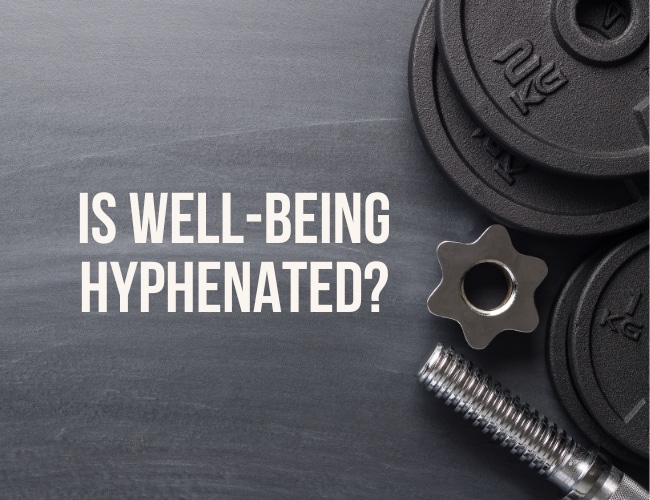Teachers in American schools often begin class by asking students how they are feeling that day by using memes that depict emotions and feelings. If you're interested in what these look like, click here. These check-ins tell the teachers about their students' well-being.
Or is that well being?
Wellbeing?
How do we decide which spelling is correct? It can affect our own well-being.

Is it Wellbeing or Well-being?
The Merriam-Webster dictionary tells us that the word refers to “the state of being happy, healthy, or prosperous.”
Knowing what the term means, though, doesn't help us with its spelling. For that, an understanding of how words evolve in the English language may be helpful.
Most compound nouns (words that are composed of two individual words, like racecar) begin as open compounds, i.e., separate words. Many of these terms remain open for a long time. Examples are front yard, real estate, and high school.
Next comes a phase in which the two words appear in hyphenated form compounds, such as twenty-one, forty-five, ninety-nine.
Finally, the two words may smush together without a hyphen as a single word. We've already seen racecar. Other words include football, backyard, and roommate. You might encounter that last one in any of its incarnations, but the closed compound is preferred today.
But what about well being, well-being, and wellbeing?
Well being is never correct for the noun referring to one's happiness, prosperity, or health. That doesn't mean they never occur next to one another, but those occurrences have a different meaning. I might write, “Malala Yousafzai has done well being the youngest Nobel prize winner at the age of seventeen.” That's different from the noun meaning state of health, prosperity, or good fortune.
The choice between well-being and wellbeing is regional or dependent on your audience for the preferred spelling.
In North America, the spelling is hyphenated. Merriam-Webster, considered the definitive dictionary for American English, gives only the hyphenated spelling (well-being).
Collins Dictionary, a reputable British dictionary, provides the closed compound, wellbeing, as correct for British English.
The trick is to decide on whether you write British or American/Canadian English and stick with that spelling. If it helps, “well” is an adverb, and “being” is a verb, so connect them with a hyphen.
Also keep in mind who you are writing for and the style requirements for your publication.
Examples of Well-being in Writing
Let's look at a few examples of well-being used in writing. Notice both the U.S. and U.K. use examples.
Teachers in the U.S. display concern for their students' well-being.
Our sense of well-being depends on many factors, including health, social connections, and financial security.
“Well-being is the experience of health, happiness, and prosperity.” (PsychologyToday)
“Many techniques to improve our well-being are readily available to us but not often discussed, such as protecting your sleep and leveraging gratitude.” (The Science of Well-Being, Johns Hopkins)
From the U.K.: “Health is the top thing people say matters to their wellbeing.” (Wellbeing; Why it matters to health policy, U.K. Department of Health)
In summary follow these two guidelines.
1. If you are North American, hyphenate: well-being.
2. If you are British, write one word: wellbeing.
Hopefully that clears up any confusion as you try to correctly hyphenate the word well-being this week. Give it a try in the practice below!
PRACTICE
Now it's your turn. Write for fifteen minutes about steps you can take to maintain or improve your well-being or the well-being of your characters.
Share your practice in the Pro Practice Workshop, and leave feedback for a few other writers. Not a member? Join us.

Robert Harrell
Robert Harrell is a grammar nerd—and a language teacher, medieval re-creationist, musician, traveler, and theologian. His interests inform his stories and coaching. Published in German, Spanish, and French, with two English-language YA/NA series underway, Robert is pursuing The Write Practice Book Coach Certification to help other writers excel. Learn more at his website.



0 Comments